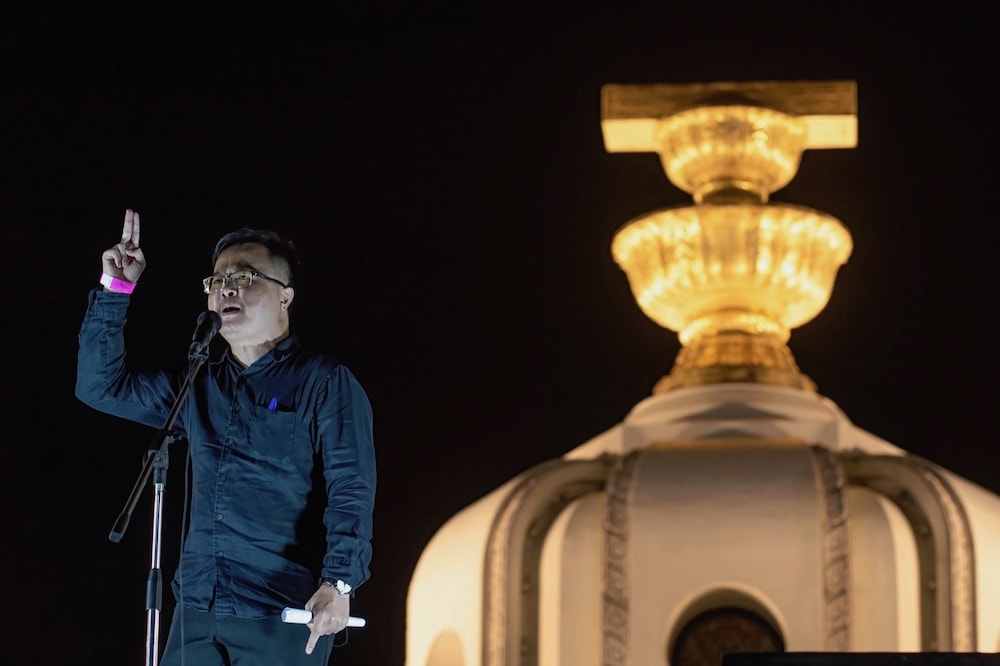Poet, human rights lawyer and activist Arnon Nampha was convicted of royal defamation for calling for monarchy reform in a public rally in October 2020.
This statement was originally published on pen-international.org on 29 September 2023.
PEN International condemns the decision to sentence poet and activist Arnon Nampha to four years imprisonment after he was convicted of royal defamation (lèse-majesté). The organisation calls for Nampha’s immediate and unconditional release, and for all remaining lèse-majesté charges against him to be quashed, and urges Thailand to repeal its deeply problematic lèse-majesté law.
On 26 September 2023, the Bangkok Criminal Court found Arnon Nampha guilty of violating Article 112 (lèse-majesté) of the Thai Criminal Code for a speech he gave at a public rally on 14 October 2020 where he called for reform of the monarchy. The court sentenced Nampha to four years’ imprisonment and a 20,000 Thai Baht fine (approximately 544 USD) for violation of an emergency decree. This is the first verdict of 14 lèse-majesté charges Nampha faces in connection to his peaceful participation in demonstrations that took place throughout 2020. Following his sentencing, Nampha was transferred to the Bangkok Remand Prison while he awaits his application for bail to be reviewed by Thailand’s Court of Appeal. PEN International understands Nampha is likely to appeal his conviction and sentencing.
‘Arnon Nampha’s unjust conviction, sentencing and arbitrary detention for peacefully exercising his right to expression is a stark example of how Thailand’s lèse-majesté law has been used to silence criticism of the government. We call for Arnon Nampha’s immediate and unconditional release, along with all those who have been unjustly detained for their peaceful expression’, said Ma Thida, Chair of PEN International’s Writers in Prison Committee.
In Thailand, insulting the monarchy is considered a criminal offence under Article 112 of the Thai criminal code (commonly referred to as Thailand’s lèse-majesté law,) and it can result in a maximum sentence of up to 15 years imprisonment per count if convicted.
The highly problematic legislation was last used in 2017 before mass protests swept across the country in 2020, which called for the law to be repealed. As part of the Thai government’s efforts to clamp down on the protests and stifle public criticism of Thailand’s monarchy, it has since charged over 257 individuals of committing lèse-majesté. The rapid acceleration in the use of lèse-majesté charges against protestors has attracted the alarm of the United Nations and its independent experts, who have called for the law’s repeal.
The marked deterioration in Thailand’s freedom of expression environment has had a direct impact on poets, writers and publishers, with several currently facing multiple lèse-majesté charges while others are facing book bans or abusive lawsuits for their writing. Despite mounting concern from the United Nations and other organisations over the practice in Thailand, strategic lawsuits against public participation (commonly referred to as SLAPPs) continue to be used against those seen to criticise the monarchy. The resulting chilling effect threatens to discourage anyone from writing about the Thai monarchy through a critical lens, undermining the right to freedom of expression in Thailand.
Background
Arnon Nampha is a poet, human rights lawyer and activist who emerged as a leader of Thailand’s protest movement in 2020. Nampha has also used poetry to shine a light on the struggles faced by marginalised groups in Thailand. A collection of his poetry, entitled People are Blind and Mute No Longer (translated), was released to coincide with the fifth anniversary of the 2006 military coup and was priced at 112 Thai Baht, a reference to the highly problematic lèse-majesté law.
In 2021, PEN International published English translations of two booklets that include speeches made by Nampha during the 2020 protests.
Nampha was initially arrested on 7 August 2020 for his participation in peaceful protests that called for democratic reforms and an end to the use of the lèse-majesté law. He continued to participate in public rallies and was frequently detained, ultimately spending 337 days in prison until his release on bail on 28 February 2022.
PEN International opposes criminal defamation in all cases. Criminalising defamation, whether of public figures or private individuals, is a disproportionate and unnecessary response to the need to protect reputations. It has a chilling effect and undermines freedom of expression. UN human rights mechanisms have repeatedly clarified that criminal defamation and insult laws, including lèse-majesté laws, are incompatible with international standards on free expression.



